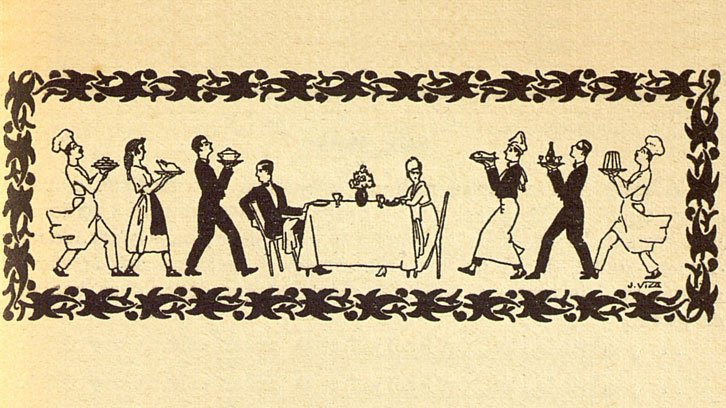Cooking, Theatre and Modernity. Barcelona, 1888-1919

Barcelona, at the turn of the twentieth century, was a booming town looking for inspiration in other European capitals. The desire to become the model of a modern bourgeois metropolis required an urban and industrial transformation that affected the popular classes particularly. The city was growing at an incredible rate and needed to solve its shortcomings in order to celebrate an event that, like Paris before, would make it the cosmopolitan capital of reference: the Universal Exposition of 1888.
Spurred on by this modernizing fever, Barcelona absorbed all the new tendencies from the European continent, among which we can highlight those belonging to the field of food. Thus, trends that began first in the field of clothing were introduced later in the field of taste and caused the city to change its way of eating and drinking. The prosperous members of Barcelona’s society abandoned their traditional dishes for the lure of foreign delicacies, cooked in luxury restaurants occupying the main artery of the restaurant area: La Rambla. The many acquisitions of Gallic origin which were offered at the tables of the most renowned elite establishments −Au Lyon d'Or, the Maison Dorée, the Suís or the Martin, among others− were reflected in the theatre, as contemporary playwrights reflected all these developments and introduced them into their texts.
The analysis of dramatic literature from the perspective of culinary arts – according to surviving gastronomic literature − opens the door to a new approach to theatre studies, as the kitchen is a multifaceted art, involving fields as diverse as history, sociology, politics and anthropology. Therefore, through a triangle with modernity, cooking and theatre as its vertices we can see the evolution of the flavour of a city that changed its face through progress to become the modern metropolis of the turn of the century.
The new Barcelona, where the bourgeoisie and artisans lived, along with workers and marginalized individuals who inhabited the underworld and surroundings, banished the "fondes de sisos",* built hotels and restaurants of the highest order, adopted foreign delicacies and deified cooks on behalf of the new trends and fashions. However, this change in eating habits was reserved for the upper classes, since all those who belonged to the popular classes had to be content with the eternal pickles, salted fish, stews or "Saturday meat pots": the wages of hunger gave no truce.
Among the playwrights who understood all these changes and who left their testimony of it, the figure of Santiago Rusiñol shines above the rest. Through the quartet that forms the core of his work, without forgetting some of his most representative titles, the author shows us the representation of reality beyond the Barcelona stage: L'Escudellòmetro (1905), which showed the gastronomic limitations that the most disadvantaged were doomed to; La “merienda” fraternal (1907), a satire against Alejandro Lerroux, the populist leader who organized "democratic lunches" as he filled his belly with gourmet delicacies; El triomf de la carn (1912), which warned of the precepts of vegetarianism and finally, Souper-Tango (1918), which denounced the vices of a Barcelona in thrall to the allies and addicted to the concert cafés.
Thanks to cooking, an everyday microcosm which is inseparable from the great theatre that is the world, we can show the evolution of a city over thirty years, from 1888 to 1919, a city which eagerly received all the culinary innovations from Europe and overseas with open arms, to become a flagship of the cosmopolitan world.
*Translator’s note: Cheap, fixed price eateries for the poor.
References
“Cuina, teatre i modernitat. Barcelona, 1888-1919”, PhD thesis by Eva Saumell i Olivella, supervised by Francesc Foguet i Boreu and read at the Department of Catalan.


